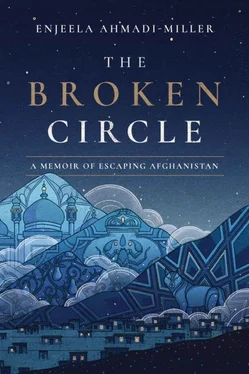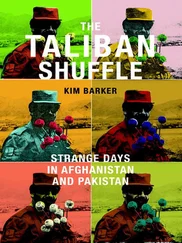Darkness blotted out the world until our eyes adjusted to the starlight streaming in through the windows. Not one light in any direction, except the glow of the moon that now hung low on the far horizon. The driver pointed across the field to our left.
Ram motioned for us to get out. We stood in the darkness in the middle of the road, jackets on, backpacks cinched onto our bodies. We lined up single file. First the guide, then Ram, followed by me, then my siblings, then Padar in the rear. I positioned myself right behind Ram. I wanted to see where we were headed. The guide didn’t use a flashlight or an electric torch; he knew the path by memory.
He led us through the woods on the other side of the clearing. I tried to stay a few hand widths behind Ram; if I lagged or got distracted and fell off the pace, Laila, who was behind me, would run into me and push me ahead. I wanted desperately to see through the trees to where we were headed, but I stayed focused on Ram.
We straggled single file out of the woods into another glade that glinted under the moonlight. The scraping of Zia’s jeans as he walked told me he wasn’t far behind me somewhere in the dark. The grass bent under a mellow breeze. We marched through the damp grass over uneven ground. The guide hesitated. We all halted and looked up from our footing and found we were at the rear wall of a weathered barn. I could smell the cows and chickens. This place wasn’t abandoned.
Ram crouched and waited for all of us to gather around him.
“The border is a ways away. We will go ahead to check the border post to make sure that it’s clear,” he said in a whisper, gesturing toward the guide. “You will wait for us inside the barn.”
Ram and the guide led us into the barn. They showed us to a corner that was dry and filled with prickly hay. “Rest here. We’ll be back.”
The two men disappeared, leaving us with a few flashlights. Beyond the pale glow of our small lights, we could hear the animals but not see them.
“I hope we don’t have to stay here too long,” Laila said. “This place stinks.”
I flashed my light down to the far end of the long barn. Several horses stamped on the hard earth in their stalls. Chickens strutted about, and the dark rafters seemed to creep with birds and critters. Padar found some straw and laid it out for us. The smell was horrible, as if the barn had not been cleaned in months; I was sure there was a massive pile of manure stacked up somewhere deep in the dark recesses of this ancient building. The hay was dry, and we lay down and covered ourselves with our jackets and waited.
“We will only be here for a few hours,” Padar said.
A few hours stretched into the entire night. Ram and the guide did not return until daybreak. We stirred from our cold sleep, rubbing our eyes and stretching our stiff limbs.
“The border is about a two-hour hike from here,” Ram said, kneeling at the edge of the hay we had used for a bed. “I stayed there all night, waiting for the guards to leave. There’s no permanent guard booth, so they park a jeep and sit and smoke in the woods. A couple of miles beyond the border is a tiny village we can hide in once we make it across.”
Ram had brought food back with him. He told us it was important for us not to be seen outside during the day. Eating inside the barn was very difficult. The constant smell of manure stripped me of my appetite. It made us all grumpy at each other.
“Are we going to have to stay here again tonight?” Zia asked.
“We’ve come this far,” Padar said, a real gentleness in his voice. “We must be patient.”
When dusk came, we all rushed outside to relieve ourselves.
Zia and I stood in the dark shadow of the barn as Zulaikha and Laila went off behind a bush.
“You smell like shit,” Zia said to me, not at all kidding.
“You smell like you’ve been rolling in horseshit your whole life.”
He pushed me away from him with a laugh. Just then, Zulaikha and Laila returned across the field.
“Are you two fighting again?” Laila asked.
“He doesn’t want to be near me,” I said, “because I might make him smell better.”
Zulaikha rested her hands on her hips. “You both smell like you’ve been rolling in horseshit.”
The way she spoke so seriously, as if we weren’t well aware of that very fact, made me laugh. Soon Laila and Zia joined in. Zulaikha always seemed like the last to get a joke.
Padar and Ram joined us from another part of the field they had disappeared to. “Children, keep your voices down,” Ram said. “You’ll spook the horses. It will give them gas, then we’ll all smell like fertilizer forever!”
Soon we were all making too much noise, so Padar herded us back inside. The fresh air outside made us only more miserable when we stepped back into the barn. Ram left after dark with the guide to search out the border post again. If he was back before midnight, we would leave; otherwise we would stay. When he didn’t return by twelve, we settled in.
This was our routine for several more days, with Ram and his guide friend returning in the early morning with food and the news that we might be able to leave with the coming dark. Padar had fashioned a table in the middle of the barn to make our life a little more comfortable. We distracted ourselves from the smell with games of fis kut, telling jokes, and making fun of each other to blind our noses to the reek while we ate breakfast, lunch, and dinner.
It was on the fifth night that an excited Ram woke us around midnight. “It’s time to go. Gather your things.”
I rose, fully awake in an instant. We threw on our coats, gathered our things, and headed outside. The weather had turned chilly, and with all the walking across fields covered in dew, we quickly became damp and cold.
In single file, under the moonlight, we silently marched along, keeping close to each other. I followed right behind Ram, who was out in front behind the guide. The local farmer who led us knew this path well. He took us between trees, along the edges of fields, and then across one sparse empty field that had been plowed but lay fallow. The pace was fast and tiring, but I didn’t dare complain.
After a couple of hours, we reached a tall stone marker, as tall as the farmer who led us. He knelt by it in the grass, and we did the same. He pointed across to a small cluster of lights in the distance. Ram thanked him, as did Padar. The moon was high now in the night sky, and it lit our way with a soft yellow glow. We followed Ram in silence. It took us another couple of hours to reach the village, which was nothing but a cluster of thatched-roof huts around a courtyard with a well in the middle. The morning twilight steadily lifted as we trod between the huts.
We rested by the well in the early-morning chill. Fog hugged the ground, and we pulled our coats around us in an attempt to stay warm. Our clothes were damp from the fields, and there was nothing to do but squeeze in close to each other to gather some warmth.
Ram left to speak to some of the villagers. When he returned, he showed us to a hut where we could sit by a fire. Seated cross-legged on the ground by the flames, an old woman fed us, and the heat and warm food revived us.
“They have mules here,” Ram said, sitting cross-legged next to us.
“I thought it wasn’t far to Nepal,” Zulaikha said.
“It’s closer if we ride than if we walk.”
Padar and Ram left to speak to the owner of the mules. A while later they came back with a string of animals, one for each of us. We had finished eating, and the woman drew some water for us to wash our faces and clean up.
A local farmer guided our train of mules. We set off as the early-morning gloom lifted and the sun peeked out from behind a distant snowcapped mountain. We traveled for seven or eight hours along slender paths, through fields, up hills, and down into a narrow valley that led to another village.
Читать дальше












